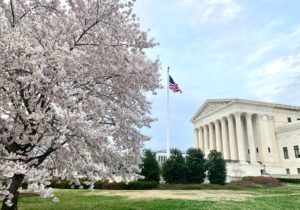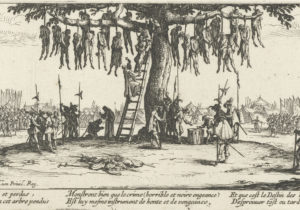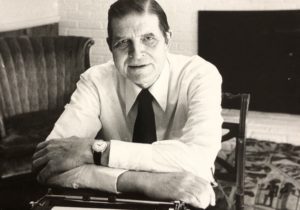During the Christmas season many inevitably again watched “It’s a Wonderful Life,” in which Jimmy Stewart as a suicidal George Bailey learns from his guardian angel Clarence how grim his hometown would look had Bailey never lived.
Bailey in his own myopic despair sees only his mistakes and ostensibly intractable familial, financial and emotional failures, from which he seeks escape by drowning. Yet Clarence the angel reveals that whatever Bailey’s errors and frustrations, his family, friends and town have been immeasurably blessed by him. This blessing, seemingly disguised by the drudgery of ordinary life, is only apparent when Bailey, in the angelic vision, is removed.
Only when seeing the disasters his life helped avert does Bailey realize the importance of his seemingly mundane and fruitless exertions. If only Clarence the angel would similarly speak to today’s American Christians who are increasingly in a funk about American leadership in the world.
And if only Clarence could have visited the just concluded Urbana Student Missions Conference attended by 10,000 evangelical young people in St. Louis. There amid the increasingly common presumptuous demonology about America, maybe he could have revealed to them what the world would be like if America had never existed.
What is America’s role in the world of 2019 as American Christians see it? For many, it is mostly if not entirely negative, meriting repentance. Urbana, one of the largest evangelical convos for young people, and which meets every three years, convened amid typical social justice laments over the “empire.” Although usually vague, empire is often equated with American power.
“The truth is that those of us who identify as Christians today are, all of us, mired in Babylon. And so many of us have been lured into supporting and promoting Empire,” bewailed Scott Bessenecker, Director of Missions for InterVarsity Christian Fellowship/USA, host of Urbana 18.
Dominique DuBois Gilliard of the Evangelical Covenant Church further explained: “Symbolically, the empire represents any power that arrogates to itself the power that belongs to God alone, or any group or institution that subjugates the poor and needy for its own advantage.”
Gilliard, like many other young Evangelical activists, in his ongoing justice advocacy intersectionally portrays America as primarily a nexus of racism and exploitation. Bessenecker further explained at Urbana of the empire: “Economy over ecology. That’s what fuels Babylon.”
Commonly America is portrayed in Christian social justice narratives as the moral equivalent of ancient Babylon or Rome, usurping God’s Kingdom and repressing God’s people. American political, military and economic power globally is a sinister force to be critiqued and resisted. This storyline not only simplistically mischaracterizes America.
It disregards traditional Christian teachings about governance and political order in favor of an implausible and unsustainable focus on political resistance. Ironically, this option of chronic critique and defiance is largely confined to privileged Americans with the safety, resources and luxury to lament their comforts.
Many other especially young Christians who don’t share this largely leftist perspective on “empire” still have an increasingly negative stance of America’s global role. From the common Millennial view, America has been a failure on the world stage, starting with the post 9/11 wars in Afghanistan and Iraq, which define their own short political memories. America is bumbling and overextended.
During his recent Iraq visit, President Trump proclaimed: “We’re no longer the suckers, folks. We’re respected again as a nation.” Many conservative Millennial Christians incline to the view that America has been “suckers” even if they don’t so much agree that America is again respected. They may not deploy “American First” terminology but their view somewhat aligns with a desire for American withdrawal from overseas commitments and traditional alliances.
Many left-leaning especially young Christians believe the world is likely better without America, while many right-leaning young Christians believe America maybe better without so much of the world. Few are the Christian voices of any age who currently espouse an assertive U.S. foreign policy and who articulate great confidence in America as world leader.
Like George Bailey, Christian millennials, along with others, only see America’s foibles and fumbles. For Christians on the left, America is intractably racist, misogynist, xenophobic, exploitative and greedy. For them, America is not the Statue of Liberty and Declaration of Independence, but rather whipping posts, Wounded Knee, lynching trees, Japanese internment, mass incarceration, police shootings and border child separation. An America corrupt at home is unworthy of leadership abroad. They seek an escape from America through erasure of borders and post-nationalism.
For many Millennial Christians who are more conservative, America is post-Christian at home while inept abroad. They do not recall the Berlin Wall’s collapse or the Persian Gulf War but only intractable Mideast conflicts and humiliations like Benghazi. They, along with left-leaning Christians, reject the perceived hyper-patriotism of traditional American conservative Christianity.
Both right and left among many Millennial Christians increasingly agree the American flag has no symbolic place in sanctuaries, with the implication that America as a project has no serious role in Christian thought and action. Neither seriously considers what the world might be like absent American influence. Both unconsciously operate from a position of privilege impossible without American political order.
Young leftist Christians might consider that America didn’t invent injustice and might study a wider universe of injustice including the genocides and terror states of Hitler, Stalin, Mao, Pol Pot, Kim Song Il, Mengistu, Saddam and countless others just within recent memory. While America has struggled to live up to its founding aspiration of human equality, other societies across millennia have easily devolved into mass murder and unbridled tyranny. Injustice is more often the political norm, and the American egalitarian vision is an unusual historical exception.
Skeptical non-leftist Christians might consider that American political and military mishaps are not new. The now forgotten American Philippine War was more lethal than Iraq and resulted in a 50-year U.S. presence. American disarmament and withdrawal after WWI were calamitous. WWII killed the equivalent of 1 million Americans in today’s population. The Korean War alternated from triumph to disaster and was hugely unpopular as it ground to an unwinnable stalemate. Vietnam tore the country apart and ended with humiliation. The failed Iran hostage rescue seemed then to embody America’s tumble from superpower to crippled giant.
Christians of left and right who want American global retreat might consider who will safeguard the sea lanes through which the world’s food and fuel transmit, who will preside over the international financial structures upon which the global economy depends, who will continue to host most of the world’s technological and medical innovations upon which improving living standards rely, and who will provide the ultimate deterrence against autocrats and aggressors who would gladly exploit any resulting power vacuum. Dismissing these questions as “empire” is an irresponsible and ungodly escape from responsibility.
No less important, absent America, what great power will articulate a political vision of human equality and liberty that traces to the God of the Bible? Christians across the spectrum and all ages desire justice, order, prosperity and opportunity for all. What alternative global architecture will facilitate pursuit of such desires?
George Bailey only appreciated the richness of his supposedly ordinary existence after Clarence the angel revealed a dark community without Bailey. Myopic self-preoccupation for Bailey obscured his appreciation for countless blessings for himself and for others. So too for America. American Christians tempted either to anti-Americanism or despair about America’s global role need in 2019 an angelic warning of the world absent America.







 Sponsor a student for Christianity & National Security 2024
Sponsor a student for Christianity & National Security 2024